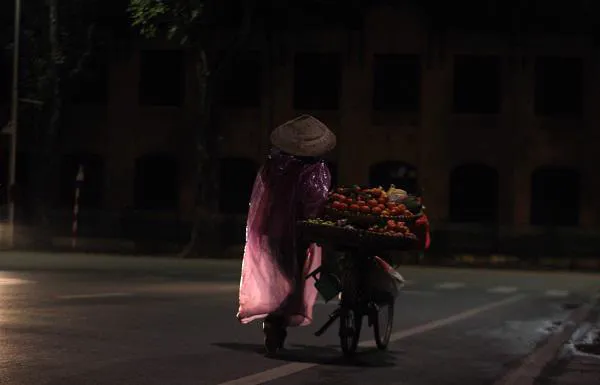Int’l voices promote innovation for empowerment of migrant women in Vietnam
Being an integral part of Vietnam’s overall development, migrant women should be equipped with digital skills to thrive in the future workforce while being protected from cyber violence.
Vietnamese migrant women workers are among the most affected by Industry 4.0, prompting international voices to empower them as they account for a large proportion of the low-skilled labor force.
| A street vendor works at night in Hanoi. Photo: Lai Tan/The Hanoi Times |
As migration is an integral part of Vietnam’s overall development, on the occasion of International Women’s Day (IWD) 2023, the UN Resident Coordinator, the IOM Chief of Mission, and ambassadors from Australia, Japan, South Korea, Sweden, the UK, and the US joined their voices to celebrate the strength of Vietnamese women and girls on the move.
They also aimed to raise awareness of and advocate for empowering migrant women with access to skilling and upskilling opportunities to bridge the digital gender divide in migration and strengthen female migrants’ resilience and competitiveness in the digital world.
Special appreciation
On the occasion of International Women’s Day, international representatives celebrated the values and contributions of Vietnamese women and shared their special appreciation for migrant women.
Pauline Tamesis, the United Nations Resident Coordinator in Vietnam highly appreciated recent efforts of the Vietnamese government to expand vocational training to raise the bar of the nation’s labor productivity.
Park Mihyung, Chief of Mission, International Organization for Migration (IOM) Vietnam: IOM is committed and eager to work with all partners to ensure innovation and digital technologies as a driver for change to foster gender equality, women empowerment for Vietnamese women, especially migrant women.
Andrew Goledzinowski, Australian Ambassador to Vietnam: I think about their vulnerability. It’s important that we work together with government agencies, civil society, and others to ensure that we use technology to help protect these people so they can get their job done, look after their families and be safe.
Yamada Takio, Japanese Ambassador to Vietnam: On IWD, what comes to my mind is more than 200,000 Vietnamese women who have migrated to Japan to study or to work. Japan is ready to work harder to further empower those migrant Vietnamese women as they are essential ties and bridges which connect our nations.
Oh Young Ju, South Korean Ambassador to Vietnam: We have to make sure that women in society including migrants would not be left out of this kind of digital capacity. Capacity building and special attention of the whole society should be needed. There’re some governmental policies that should be tailored in line with the awareness.
Ann Måwe, Swedish Ambassador to Vietnam: We have to acknowledge that migrant women face challenges, risks, and vulnerabilities. They are much easier to fall victims if they cannot access information and data that they need before they take important decisions to migrate and take up education or work somewhere else in the world.
Iain Frew, British Ambassador to Vietnam: Women migrate to pursue work or educational opportunities to seek a better life for themselves and their families. Developing those skills can ensure women are able to access vital services like banking, healthcare, transportation, and legal support to find information and pursue their livelihoods.
Marc Knapper, US Ambassador to Vietnam: Many scam artists and human traffickers are out there using digital platforms to lure again folks who don’t have skills. In Vietnam, we work very closely with the US Embassy and the Vietnamese government and NGOs here to make sure that there are education and other opportunities available including through a program workforce for an Innovative and startup environment that helps individuals to gain the skills.
On this occasion, UN Coordinator in Vietnam Pauline Tamesis noted that only by equipping Vietnamese migrant women with 21st century skills can they fully participate in the global economy. “Let us work together so that migrant women can gain digital skills required to thrive in the future workforce while also protecting themselves from cyber violence,” she emphasized.
Migration – opportunities and risks
Migration is an integral part of Vietnam’s overall development which is reflected in the number of Vietnamese citizens migrating both internally and abroad for work, study, marriage, family reunification, and other purposes.
Labor migration has become a steady contributor to Vietnam’s socio-economic development. Vietnamese women make up 55,5% of the country’s migrant population according to the Vietnam Women’s Union survey. In 2020, there were 3.4 million Vietnamese who migrated (3.3% of the total population), and 50.3% of total migrants were women.
While migration has provided many women with opportunities to improve their lives and families, Vietnamese migrant women at the same time face challenges, especially in the face of Industry 4.0.
As nearly 80% of working-age women in Vietnam are either low-skilled or unskilled, migrant women workers make up a sizable proportion of the labor force engaged in lower-skilled economic sectors or labor-intensive positions, which account for nearly 74% of all jobs in Vietnam.
As Industry 4.0 is rolled out, automation and technological advancements are forecast to cause a rapid decline in demand for unskilled and low-skilled labor. Up to 86% of workers in Vietnam's textile and footwear industries are at risk of losing their jobs within the next 15 years.
In another aspect, women particularly migrant women looking for jobs have faced growing risks in online spaces. This is because, on the one hand, the online platform has become an increasingly popular channel for searching for job opportunities, on the other hand, technology enables traffickers to easily trap victims.
Women, especially young women and girls with little or no skills have been targeted by smugglers and traffickers whose criminal operations are transnational. Trafficked Vietnamese including women are found not only in Europe, North America, and the Gulf States, but also in Cambodia, Myanmar, the Philippines, and African countries.












